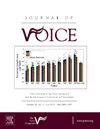Novel Respiratory Therapy for the Improvement of Post COVID Condition Symptoms: A Case Series
IF 2.4
4区 医学
Q1 AUDIOLOGY & SPEECH-LANGUAGE PATHOLOGY
引用次数: 0
Abstract
Introduction
Speech-language pathologists are seeing a growing number of patients whose voice and upper airway symptoms are complicated by dyspnea, cognitive difficulties, anxiety, extreme fatigue, and other debilitating post COVID symptoms. These patients are often less responsive to traditional speech-language pathology treatments and there is emerging literature that suggests dysfunctional breathing (DB) might contribute to dyspnea and other symptoms in this patient population. Treatment of DB through breathing retraining has been shown to improve breathing and successfully reduce symptoms similar to those seen in patients with long COVID. There is some preliminary evidence that breathing retraining is helpful for patients with post COVID condition symptoms. However, breathing retraining protocols tend to be heterogeneous and are often not systematic or well described.
Methods
This case series reports on an Integrative Breathing Therapy (IBT) protocol used in patients diagnosed with post COVID condition symptoms attending an otolaryngology clinic who presented with signs and symptoms of DB. A systematic evaluation of the biomechanical, biochemical, and psychophysiological dimensions of DB based on principles of IBT was performed on each patient to enable targeted patient-centered care. Patients were then provided with intensive breathing retraining that aimed to comprehensively improve breathing functionality in all these three dimensions of breathing. Treatment involved 6–12 sessions of weekly 1-hour group telehealth sessions combined with 2–4 individual sessions.
Results
All participants showed improvements in the parameters of DB measured and also reported a reduction in symptoms and improved daily function.
Conclusions
These findings suggest that patients with long COVID who present with signs and symptoms of DB might respond positively to comprehensive and intensive breathing retraining that addresses biochemical, biomechanical, and psychophysiological dimensions of breathing. More research is required to further refine this protocol and confirm its effectiveness through a controlled trial.
新型呼吸疗法改善COVID - 19后症状:病例系列
语言病理学家发现,越来越多的患者的声音和上呼吸道症状伴随着呼吸困难、认知困难、焦虑、极度疲劳和其他使人虚弱的COVID后症状。这些患者通常对传统的语言病理学治疗反应较差,并且有新出现的文献表明,呼吸功能障碍(DB)可能导致这类患者的呼吸困难和其他症状。通过呼吸再训练治疗DB已被证明可以改善呼吸并成功减轻类似于长COVID患者的症状。有一些初步证据表明,呼吸再训练对出现COVID后症状的患者有帮助。然而,呼吸再训练协议往往是异质的,往往不是系统的或很好的描述。方法本病例系列报告了综合呼吸治疗(IBT)方案,用于在耳鼻喉科诊所诊断为COVID后症状的患者,这些患者出现DB的体征和症状。基于IBT的原则,对每位患者进行生物力学、生化和心理生理维度的系统评估,以实现以患者为中心的针对性护理。然后为患者提供强化呼吸再训练,旨在全面改善所有这三个呼吸维度的呼吸功能。治疗包括6-12次每周1小时的小组远程医疗会议,结合2-4次个人会议。结果所有参与者的DB测量参数均有所改善,症状减轻,日常功能改善。结论这些研究结果表明,出现DB体征和症状的长COVID患者可能对全面和强化的呼吸再训练有积极的反应,这些再训练涉及呼吸的生化、生物力学和心理生理层面。需要更多的研究来进一步完善该方案,并通过对照试验确认其有效性。
本文章由计算机程序翻译,如有差异,请以英文原文为准。
求助全文
约1分钟内获得全文
求助全文
来源期刊

Journal of Voice
医学-耳鼻喉科学
CiteScore
4.00
自引率
13.60%
发文量
395
审稿时长
59 days
期刊介绍:
The Journal of Voice is widely regarded as the world''s premiere journal for voice medicine and research. This peer-reviewed publication is listed in Index Medicus and is indexed by the Institute for Scientific Information. The journal contains articles written by experts throughout the world on all topics in voice sciences, voice medicine and surgery, and speech-language pathologists'' management of voice-related problems. The journal includes clinical articles, clinical research, and laboratory research. Members of the Foundation receive the journal as a benefit of membership.
 求助内容:
求助内容: 应助结果提醒方式:
应助结果提醒方式:


